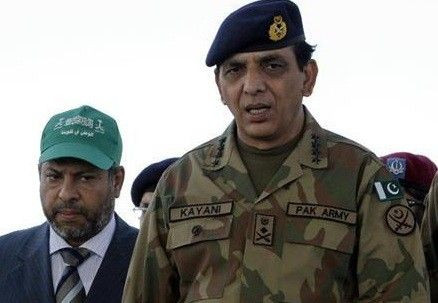US, Pakistani Brass Meet As Drone War's Future Hangs In Balance

The heads of the U.S. mission in Afghanistan and Pakistan's armed forces met for the first time in several months to discuss their precarious alliance, as American forces try to preserve vital drone operations in Pakistani airspace.
Wednesday's high-level meeting was the first bilateral military visit since a cross-border attack by NATO helicopters last November killed 24 Pakistani soldiers, prompting Pakistan to re-evaluate its level of cooperation with Western forces in Afghanistan.
The conference came a day after President Barack Obama met with Pakistan's Prime Minister Yusuf Raza Gilani at a summit in South Korea. Obama urged Pakistan to respect U.S. security needs.
Pakistan's parliament is reassessing the lucrative but strained bilateral relationship with Washington, including whether Pakistan should reopen overland supply routes to Afghanistan and allow U.S. drones to attack militants using its airspace.
Pakistani army chief Gen. Ashfaq Kayani met with Gen. James Mattis, head of the U.S. military's Central Command, and NATO Afghanistan commander Gen. John Allen, Pentagon spokesman George Little said.
We are hopeful that the ground supply routes will open in the near future. They are important to our effort in Afghanistan, Little was quoted as saying, though he declined to give details.
The United States is desperately trying to prevent Pakistan from imposing a ban on U.S. drones used to strike militants near the Afghan border.
Although U.S. officials offered a series of key concessions -- including giving Pakistan's intelligence agencies advance notice of any strike -- the South Asian country flatly rejected all of them, the Associated Press reported Tuesday, citing officials on both sides who spoke on condition of anonymity.
A ban on drone operations would be a major blow to Washington, ending one of the U.S. military's most effective campaigns against al Qaeda.
U.S. officials also want Pakistan to reopen its border crossings with Afghanistan, whose closure has forced NATO to use costlier northern routes to supply troops.
The Pakistani military said Wednesday's meeting would focus on an investigation into the deadly Nov. 26 cross-border incident. The meeting will also look at border security and coordination measures and how to improve them, a senior Pakistani military official told Reuters, requesting anonymity.
On Thursday, a foreign-ministry spokesman said Pakistan is looking forward to normalizing relations with the United States once the parliament completes its assessment of the NATO-supply issue, the English-language daily Dawn reported.
Abdul Basit, speaking to reporters in the capital, Islamabad, expressed confidence that the parliamentary process will be completed soon and lay the foundation for a strong and stable bilateral relationship. He also said Pakistan's government will follow whatever guidelines lawmakers set with regard to drone strikes.
© Copyright IBTimes 2024. All rights reserved.





















